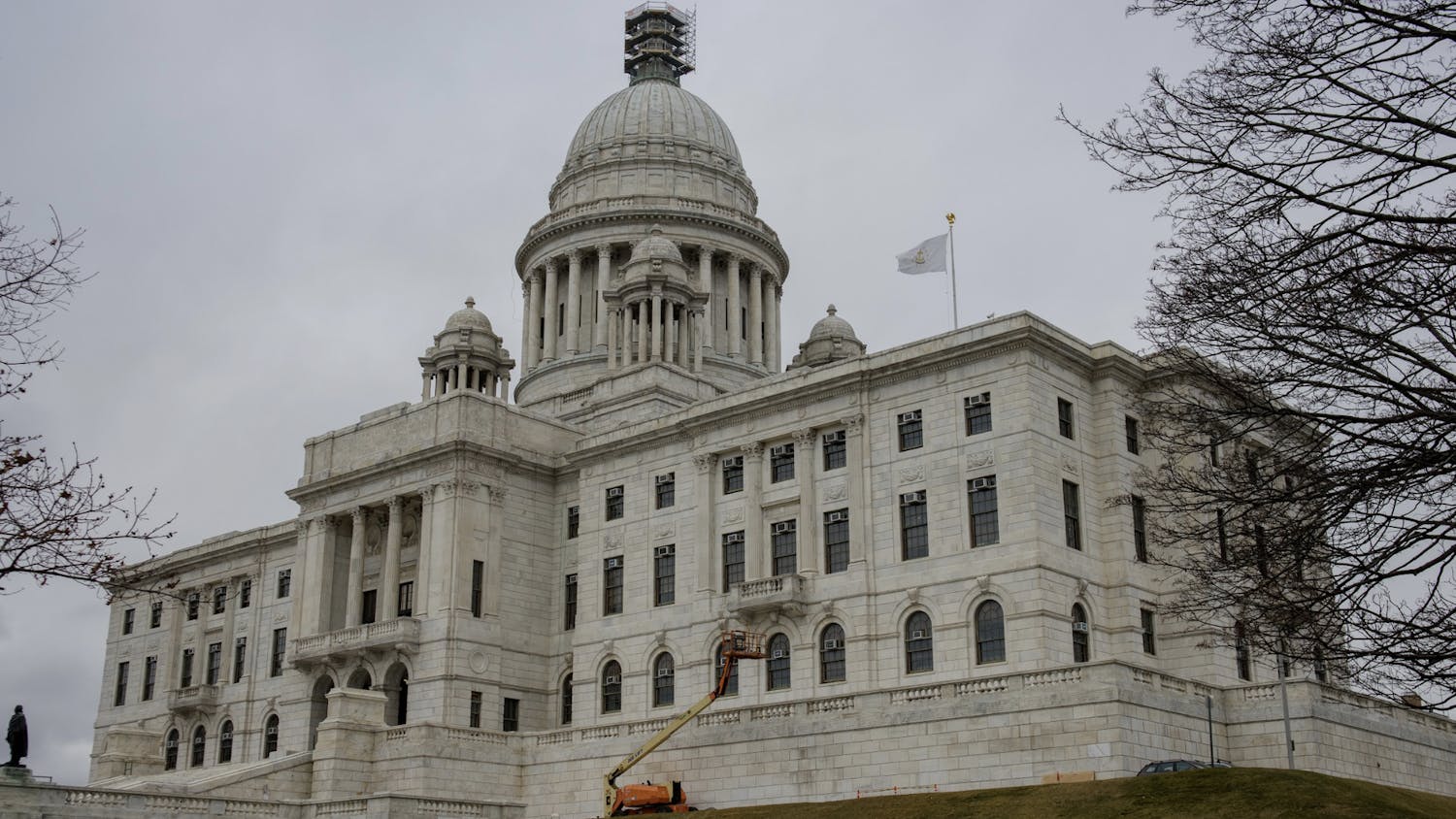This Wednesday will determine which two of the six contending candidates will represent the Republican and Democratic parties in the Rhode Island general gubernatorial election in November. The five independent candidates who are running in the general election will not appear on the primary ballots.
The incumbent, Gov. Gina Raimondo, is challenged by former State Representative Spencer Dickinson and former Secretary of State Matt Brown on the Democratic ballot. Among the Republicans, Cranston Mayor Allan Fung is running against former businessman and military officer Giovanni Feroce and R.I. House Minority Leader Patricia Morgan.
During the last general election in 2014, Fung lost to Raimondo with 36.3 percent of the vote to Raimondo’s 40.8 percent. A July 2018 Fleming and Associates poll projecting a face off between these two candidates measured Raimondo’s lead on Fung at 2.2 percent.
Gina Raimondo
One of two female governors in the nation, Raimondo emphasizes the gubernatorial race in both a national and local context. While Rhode Islanders prioritize “creating jobs and investing in training and education, so everyone can succeed in today’s economy,” they also perceive “risk” in this election and “want a governor who is willing to stand up against the Trump administration’s agenda,” Raimondo wrote in an email to The Herald. She cited her specific opposition to oil drilling off the R.I. coast and support for taking guns from domestic abusers as examples of her own consistent opposition to President Trump.
Raimondo hears Rhode Islanders voicing concerns most often about “creating jobs and strengthening our economy; keeping schools safe from gun violence; protecting a woman’s right to choose; defending the Affordable Care Act in Rhode Island; moving to renewable energy; investing in education; and fixing our school buildings, roads and bridges,” she wrote.
Raimondo describes a prosperous Rhode Island on an upward economic trajectory. “In just four years, Rhode Island has gone from having one of the highest unemployment rates in America to having the most jobs in our state’s history,” she wrote. Her campaign website states that Rhode Island’s economy has moved from 36th best economy to 17th best under her leadership, though some of her opponents highlight that this year, Rhode Island’s position slid from 9th best in the first quarter to 17th in the second quarter, according to Business Insider. There are more Rhode Islanders working now than in each of the past 10 years, and the state is number one for rising wages, according to the campaign website.
Additionally, Raimondo aims to make R.I. energy “10 times cleaner” by 2020, according to her website. Green energy jobs have increased 66 percent during her time in office. Raimondo has faced criticism for endorsing a controversial construction project by the energy company Invenergy to build a $1 billion power plant in Burrillville that would burn natural gas. The project was taken to court by the Conservation Law Foundation, and the case will be decided at the end of this month.
Raimondo has received endorsements from the Democratic Party, Planned Parenthood and several unions, including the local chapters of the Service Employees International, Allied Craftsmen and Iron Workers and Bricklayers unions. She currently holds over $4 million in campaign funds, according to Followthemoney.org.
Half of Rhode Islanders view Raimondo positively, according to a February WPRI/RWU poll.
Spencer Dickinson
For Dickinson, the issues at stake in this race are “overwhelmingly local,” he said. Dickinson represented Rhode Island’s 35th district in the State Congress from 1973 to 1980 and again from 2010 to 2014. While Dickinson’s campaign also emphasizes health care, women’s rights, education and infrastructure, he opposes the Burrillville power plant.
In summary of his viewpoints, Dickinson charged that “the one underlying issue is the competence of the governor.” Dickinson criticized infrastructural and “administrative failures,” which waste government money. As an example, he referred to the RhodeWorks Tolling Program, a project to fund road and bridge construction through truck tolls. The program cycled too much money out of state by paying an externally based company to photograph license plates, he said.
The risk of Providence going bankrupt constitutes “probably one of the biggest threats to the state of Rhode Island right now, to Providence or Brown (University) or anybody else,” Dickinson said. Providence faces an enormous pension deficit, The Herald previously reported. Like Mayor Jorge Elorza, Dickinson favors leasing Providence’s water supply, which provides water to two-thirds of Rhode Island, to fund the deficit. Dickinson said that the water supply was a billion-dollar asset, and thus should generate more revenue than the $404.2 million at which it has been valued.
Dickinson expressed concern about the distortion of politics by big money. “We are at risk today in this country of having money, big money, take over our governing process. I think it’s probably already happened,” Dickinson said.
Matt Brown
Brown is a former R.I. Secretary of State and co-founder of the nonprofit Global Zero, which opposes nuclear weapons.
“The system that we have is broken,” Brown said, and it can only be fixed by “fundamental changes (that) tackle economic inequality, the environment and the corruption of politics with money.”
Rather than consider GDP or stock market metrics, “I measure the economy by how people are doing in their daily lives,” Brown said. “Everything, in the end, is local.”
Brown emphasized that people are struggling. “The economic fact that matters to people is that the cost of the things people need — health care, housing, college — have gone through the roof for four years, and they’re still going through the roof. And wages have stayed essentially the same,” he said. He underscored the need for more affordable housing and a better climate for small businesses.
When it comes to the environment, there are no technological or cost barriers to promote clean energy sources, Brown said. “The costs are dropping so fast it’s almost hard to keep up — both solar and wind.” He added that “the barrier is political leadership, and I intend to bring it.” Brown opposes the Burrillville power plant and “all new fossil fuel infrastructure.” His goal is to have Rhode Island fueled by 100 percent renewable energy by 2035. Raimondo’s approach, he said, is “just not at the scale of the problem that we’re facing.”
Brown intends to combine his policy priorities of economy and environment to build a green energy economy “that would create 11,000 jobs that can never be outsourced because they’re tied to the Rhode Island landscape.”
Campaign sparring between Brown and Raimondo has been especially bitter. Raimondo’s campaign advertisements attacking Brown have highlighted a 2006 charge that Brown violated campaign contribution limits while running for R.I. senator, a charge Dickinson repeated. On Tuesday, Brown filed a cease-and-desist letter stating that all of these charges were dismissed by 2007. He called these and other allegations about his financial history “absurd false attacks.” He has criticized Raimondo for “refusing to do one debate.” Raimondo declined to participate in a round-table debate because Brown “lies,” she said in an interview with the Providence Journal.
Brown was endorsed by progressive groups including Our Revolution RI and Justice Democrats.
Allan Fung
Fung paints a pessimistic picture of the state’s economic climate. His campaign website claims that Rhode Island is the worst in the country for job opportunities. He proposes cutting taxes and adopting various measures implemented in Cranston at the state level, including the establishment of legislature term limits and a Business Concierge Program intended to make Rhode Island more accommodating to new businesses. Fung would also increase the authority of the governor’s office by introducing the line-item veto and adding an Inspector General office as a check on the executive, according to his website.
Fung’s platform also stresses attention to Rhode Island’s veterans, and he advocates for making military pensions tax-exempt. “As Mayor, (Fung) has been at the forefront of listening to, and caring for his local veterans,” according to a campaign release, which further specified that Cranston was the first community to exempt disabled veterans from paying property taxes.
While Fung has, at one point, described himself as pro-choice, he has converted to Catholicism and supports “certain common-sense restrictions, … while still respecting a woman’s right to make a medical decision,” he told the Providence Journal. He does not support late-term abortions.
Fung’s stance on gun control has evolved during his time as a civil servant. In 2004, as a Cranston City Council member, he voted for a resolution that called upon Congress to renew a ban on assault weapons. He now does not support a complete ban on assault weapons, according to the Providence Journal. Fung supports the right of “law abiding citizens to own a firearm,” and he shoots recreationally. He attributed the issue of gun violence to criminals and advocates for heavier sentencing, according to the Providence Journal.
Fung has been endorsed by the Rhode Island Republican party.
He could not be reached for comment by press time.
Giovanni Feroce
The single most important issue to voters this election season is “leadership,” Feroce wrote in an email to The Herald. Feroce feels qualified to be governor through his experiences in “business, politics and the military,” he said. The former state senator has also served as CEO of the jewelry company Alex and Ani and the watch company Benrus, The Herald previously reported. In 2017, he was banned by Benrus and sued by creditors, including the Internal Revenue Service, when he could not meet the company’s owed payments, according to the Providence Journal. The Journal reported that Benrus has experienced financial struggles in the past.
Feroce proposes that Rhode Island’s economy shift to revolve around Boston. Since “the current R.I. economy lacks in-state opportunities,” Rhode Islanders would be better served by an administration that prioritizes “transportation, infrastructure and housing concepts that are affordable, flexible and technologically advanced” — allowing graduates to live in Rhode Island and commute “to high-paying jobs in and around Boston,” Feroce wrote.
Additionally, Feroce hopes to focus the R.I. economy on technological development, specifically in blockchain, a technology originally designed for trading Bitcoin that serves as a distributed ledger for storing information. “Rhode Island can lead the nation, economically and technologically, by becoming the ‘Silicon Valley’ or ‘Route 128’ for the greatest technological breakthrough since the invention of the World Wide Web: the blockchain,” Feroce wrote. He specified instituting education, a welcoming business climate and the governmental adoption of the blockchain infrastructure as necessary measures to realize this vision for the state.
Feroce opposes the construction of the Burrillville power plant, he wrote. He opposes gun control, according to the Journal. He would not sign the Reproductive Care Act but does not favor a ban on abortion, according to the Journal.
Feroce has been endorsed by the Burrillville Republican Town Committee.
Patricia Morgan
Elected the first female minority leader in the R.I. State House last year, Morgan believes that “most people are concerned about the poor performance of our state’s economy” and that Rhode Island is not on par with national economic growth, she wrote in an email to The Herald, adding that the current approach has led it to be “first in and last out of every recession.” She dismissed the drop in unemployment figures as stemming from the creation of “part-time and temporary jobs” and lamented that Rhode Island has the third highest rate of attrition for college graduates. She would “offer tax credits to employers that establish a plan to help (graduates) pay their college loans,” she wrote.
Morgan is also in favor of the creation of an Inspector General office to improve government oversight. She would expand tax cuts, including on social security, and also hopes to improve access to healthcare. Morgan is pro-life and supports increasing access to contraceptives, according to the Journal. She describes herself as an advocate for Second Amendment rights and has suggested taking steps to make school facilities more secure, according to the Journal.
Morgan has been endorsed by the West Warwick Republican Town Committee.





